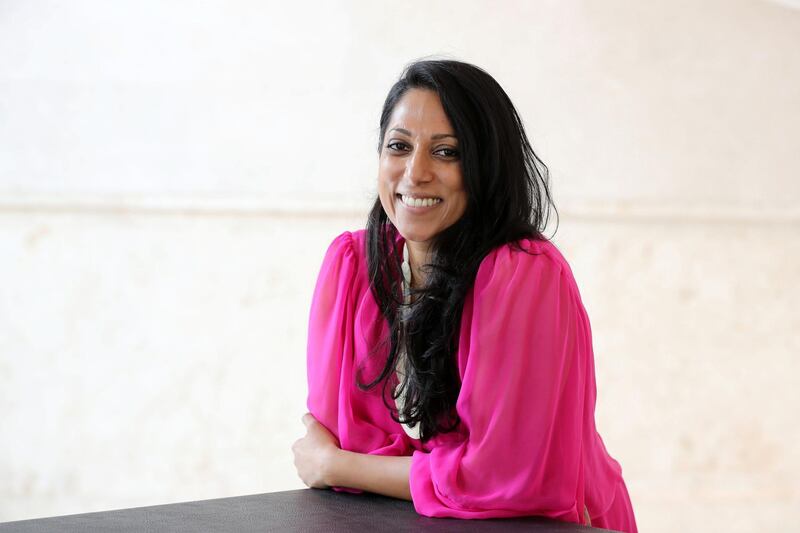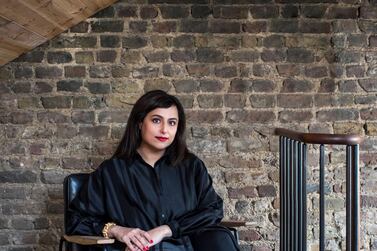It was during a two-hour conversation on the porch of Gracie Mansion, the residence of the Mayor of New York, that Penny Abeywardena realised that taking on the role of the city's Commissioner for International Affairs would give her a global platform from which to contribute to making a meaningful impact on climate change.
That meeting took place two years after superstorm Sandy's 80 miles (about 129 kilometres) per hour winds had hit New York and the US East Coast in October 2012. Sandy, which caused more than $70 billion (Dh257.1bn) in damage, was one of the most costly natural disasters in American history and subsequent scientific research has suggested that climate change has made such weather events more severe. In Sandy's case, unusually warm waters and higher sea levels helped give it greater destructive force.
In Abu Dhabi 🇦🇪 for @UN World Urban Forum #WUF10 & had pleasure to spend a few hours w/ @UAEMissionToUN Ambassador, @Zakinus Minister of State & Brooklyn’s own John Sexton, former President of @nyuniversity - it’s been a good Saturday, folks 👇🏽 pic.twitter.com/YYxAvvX72L
— Penny Abeywardena (@PAbeywardena) February 8, 2020
Eight years on, sitting in a bright, window-filled restaurant in the St Regis resort on Saadiyat Island, overlooking the glimmering turquoise waters of the Arabian Gulf, Abeywardena searches for the right words to describe how it felt to be in New York when the extreme weather hit.
"Honestly, for lack of a better word, it was weird. The city, we just didn't know we could be impacted like that. It happened a couple of days before the New York City marathon and it ended up being cancelled, which is a huge deal."
"There were no lights below 34th Street in Manhattan. It was an extraordinary, surreal time and you just knew something needed to change. This really was a moment when you saw a powerful global urban centre handicapped and you realised how much more we all needed to do, whether it was government, private sector, civil society, so I think the city really stepped up."
She highlights how the mayor she works for, Bill De Blasio, who took office in 2014, is committing to divesting $5 billion of the city's pension funds that are invested in major fossil fuel companies. It is part of a global effort on "climate justice" and "climate accountability", which also includes cities such as London.
“We believe that we need to push ourselves and in fact while we are focused on resilience [to the effects of climate change], we also as a government have to push ourselves around the climate accountability. That is again the divestment. We are hoping to be free of fossil fuels in the next couple of decades. That is the kind of urgency we have to bring to our climate agenda.”
Abeywardena had for five years, before joining De Blasio’s administration, already been working to support efforts in another, urgent, global arena – gender equality – but in the private sector with the Clinton Global Initiative, a non-profit set up by former US President Bill Clinton. Part of the appeal of going into the public sector for her was the size of New York City which, with an estimated population of about 8.5 million people, offers a scale equivalent to a middle-size country.
Day to day, her role as the city's international affairs commissioner involves a lot of engagement with the massive diplomatic corps that works and lives there thanks to the presence of the headquarters of the United Nations. Historically, the focus of the job has been on the operational side of serving this constituency, such as the non-payment of parking tickets, and any diplomatic incidents or security issues. However, through the regular schedule of engagement this requires, Abeywardena also has the chance to also touch upon a broader agenda. "We hold courtesy meetings with all the new ambassadors and consuls-general and something I realised really early on when I was appointed is how powerful [that] I get this ambassador's time for 30 minutes. I want it to be more about than just the operational [such as] how are you navigating the airport, which is important and we do that but, more importantly, [to say to them] 'What is a priority for you related to the UN Sustainable Development Goals, or your community, and how can we engage on that?'" Abeywardena is not involved in creating policy, making a point of highlighting the work her colleagues do on this front for New York, whether in the city's transport or sanitation departments, for example.
“My job is to translate what is working in New York City and bring that into the global conversation. The most important aspect of what we are doing is creating a narrative and a platform to exchange best practices because we are not in a time when we need new ideas. There are brilliant ideas that are happening in the UAE, that are happening in Brazil, that are happening in the UK, and what we need is a mechanism by which we are talking to each other, that we can accelerate impact on the ground, because policies are moving that much quicker.”
Her office ends up having the equivalent of a foreign ministry function because of the importance of public policy to New York in general, she says.
"I enjoy it largely because my job allows me to pivot into very complicated issues but from a positive perspective … This needs to be about solutions. I serve all 193 [UN] member states … and that means there are going to be a lot of areas in which we are probably going to disagree but I get to show up and say 'Hey, I know you care about this, I do too, how can we move that agenda forward?'. That is really what is at the core of true diplomacy, so I love it."
New York City, like other major centres, amid rising levels of urbanisation around the world, was likely always to end up taking on a leadership role beyond the US, according to Abeywardena.
“It is not only that other cities can replicate what we are doing, other states can. So how do we push ourselves to do the most for our community and then how do we spread those ideas and what a unique opportunity to have an agency that gets to have this relationship with the international community and then be able to create that global platform.”
New York's multilateral posture has been helped along by the priorities of the current Federal administration, led by President Donald Trump. The government has tightened up on immigration and has withdrawn from the landmark 2015 Paris agreement to limit global warming. These decisions have created an opportunity for local authorities to pick up the mantle in areas they still believe should be a priority. "We recognise that an issue like migration has to do with borders and how you are coming in but once you come in we are the ones who have responsibility over how you interact with our health and human services, our NYPD, our school system. That is an important distinction in terms of how we are interacting on these issues," she says.
For Abeywardena, who was born in Sri Lanka, there is also a more intimate poignancy to the role she has found herself in.
“I was an undocumented immigrant when I first came to the US and I got a path to citizenship because of Ronald Reagan’s amnesty in 1986, and now look at me. I get to be the global ambassador for one of the US’s most powerful cities and that, to me, is what the American story is about.”
However, there remains the risk for the city of New York that by championing multilateralism it could slide into a political confrontation with the Federal government, undermining its effectiveness on problems such as climate change. Abeywardena believes the city has avoided this pitfall so far by focusing on what she calls "movement building" – essentially this isn't only about putting New York front and centre. She highlights how 400 cities worldwide have said they would accelerate their action on climate change, including those in America.
When even "small cities in Alabama have agreed to this" it becomes very important that climate change shouldn't become a political fight, she says.
Fun fact: I’ve never been more nervous! But I loved it - excellent discussion on Europe’s Green Deal (of course @NYCMayorsOffice Green New Deal & climate justice) w/ Prime Ministers of the Netherlands & Greece, IKEA’s CEO & VP Euro Commission - watch it! #WEF20 pic.twitter.com/v1jCSqmIJL
— Penny Abeywardena (@PAbeywardena) January 23, 2020
There is no doubt that as a result of New York taking on a leadership role abroad that Abeywardena's own international profile has increased. She was actively involvement at the World Economic Forum's annual meeting in Davos in January and also participated in the World Urban Forum in Abu Dhabi at the beginning of February. In the same week in the capital, she attended the Milken Institute's Middle East and Africa Summit, which is when she spoke to The National.
“The sustainable development goals give us that lens and framework from which we can do that and talk about gender equity, talk about climate change. This is what matters to New Yorkers and this is what matters to the New York City government. Here are our allies from Helsinki to Freetown or Los Angeles that feel the same about these issues.”








